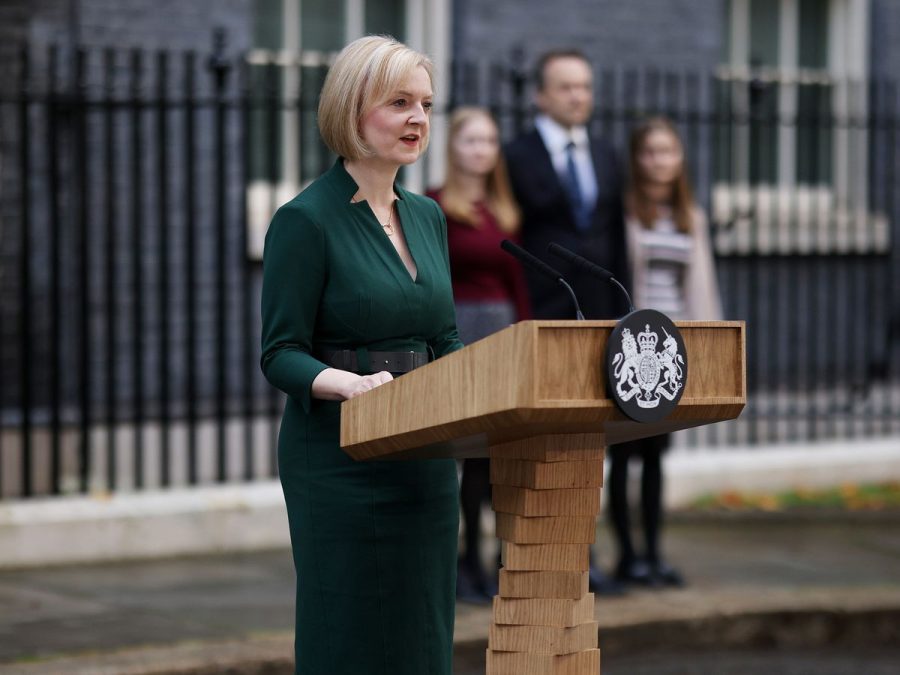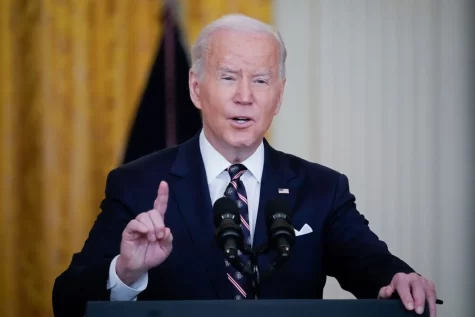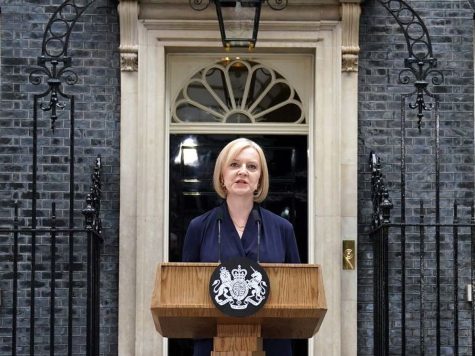Liz Truss’ resignation shows she’s a ‘quitter’ after all
Rishi Sunak now inherits the issues Truss could not solve
Liz Truss announces her resignation outside No. 10 Downing Street, the residence of the British Prime Minister.
November 10, 2022
“I’m a fighter, not a quitter,” said Liz Truss shortly after winning a leadership election and being appointed Prime Minister of the United Kingdom in early September. Only six weeks after promising to be a fearless leader and proposing many ideas to rectify the economic crisis, this “fighter” announced her resignation. Truss is abandoning a sinking ship that has hit a glacier of failed tax-cutting policies, financial turmoil and magnified inflation rates. After being succeeded by Rishi Sunak, Truss is leaving office as the shortest-serving prime minister in British history — a prime minister has been appointed and resigned, and her successor chosen, all within two months.
However, only a small part of the British population had a say in this matter, despite the fact that escalating inflation rates and economic crisis are primarily affecting the public and working class. The people should have been able to vote for the “fighter” that could fix their terrible predicament.
Nonetheless, Truss did not honor her promise to stay in office until a new successor was chosen, and the Conservative Party was left scrambling to choose her replacement.
Truss’ political collapse was largely due to her failure to rectify Britain’s economic crisis, despite her promise to bring a new era of growth by the end of her term in office. Her tax cut plan — which many investors were worried would drastically worsen inflation — sent the U.K.’s financial market plunging to its downfall. The political damage had been done, and Truss’ efforts to abandon the plan were unfruitful. She could not undo the harm that her proposal had spurred.
In light of my article supporting Truss’ appointment, the way these events have unfolded may seem ironic. In my defense, Truss did make some very promising pledges to the British people and government. But that was all they were, just promises. She talked the talk but could not walk the walk. As the third woman to serve as U.K. prime minister, I was hoping she would be able to emulate the example that her two predecessors had set.
After Truss quit, Sunak was chosen by the Conservative party to be the next prime minister. Sunak is the first person of color and Hindu to serve as prime minister, as well as the youngest leader in two centuries. Due to Truss’ failure, Sunak has been left with a country in a deeper economic crisis and a Conservative Party even more fractured than before her appointment.
While I am hesitant to make any big predictions, things are not looking good for Sunak. The economic state of the country is worsening every day and he has yet to declare a plan of action. Given that Sunak is a billionaire whose net worth is twice that of King Charles III, many believe that he is out of touch with the working class and does not understand the challenges they are currently facing. Hopefully, Sunak will prove to be a better “fighter” and problem-solver than his forerunner. As he told the press, “that work begins immediately.”






















